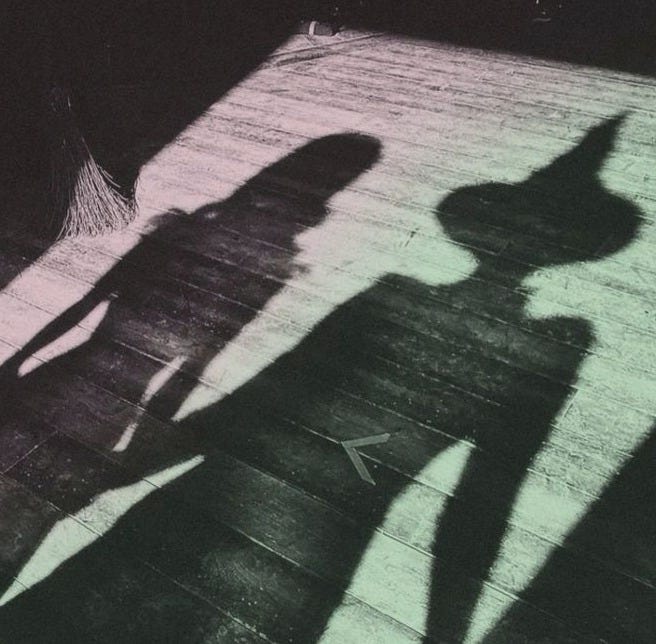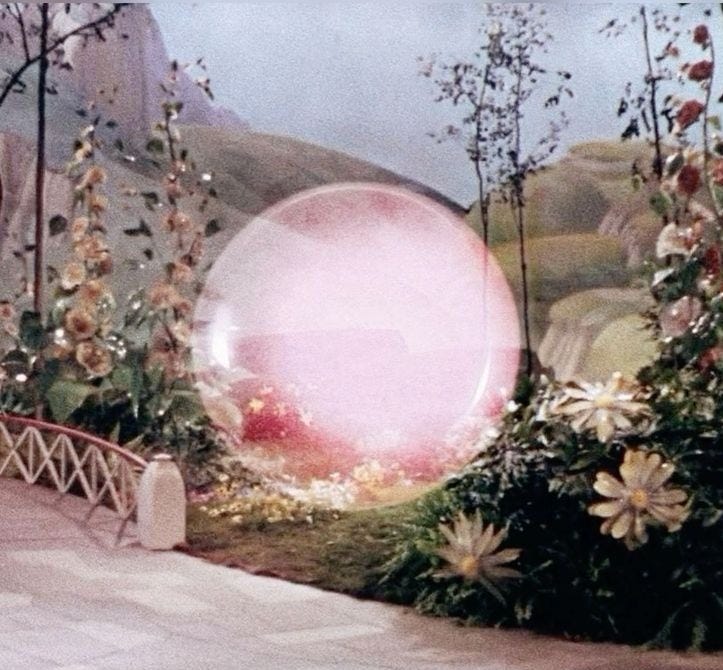The price of being 'good'
the glinda-elphaba dichotomy, fear of reprisal, systemic pressures, possibility of change
Happy holidays! Welcome to Bonded. New articles are posted every Tuesday. In my last essay, What matters most at work, I explored how motivation at work stems from genuine appreciation and connection, rather than fear, greed, or superficial incentives. If you want to write-in: ask a question, tell a story, or share a comment, please do so here.
Please “like”, “share”, or “comment” if you enjoyed this article or found it interesting. It would help the piece reach more people, and it would mean the world to me. 💌
Earlier this year, over dinner, a friend told me about her boss.
“He said, ‘Can I tell you something that will only stay between us?’ And then he told me he slept with my coworker,” she said, shaking her head. “He didn’t even seem embarrassed. Just… casual. Like this was normal. Then he added, ‘I know this looks bad. Just don’t say anything, okay?’”
A few weeks later, he rearranged the org chart so she’d manage the woman he’d now been seeing. My friend didn’t love it. She hated being caught in the middle of their mess. But at the same time, she felt like her boss trusting her meant she was doing something right.
Then, a few weeks after that, he told her they’d stopped seeing each other. But her new direct report still had a direct line to him. They were still texting.
Over dinner, she sighed and said, “I know how messy it is. I wish they hadn’t pulled me into it. But part of me thought… if he’s trusting me with this, maybe I’m on the right track.”
I didn’t know what to say. Because I’ve been her. I think most of us have.
In these moments, it’s hard not to feel trapped. Caught between the desire to do what’s right and the fear of what standing out might cost you. It’s a tension I couldn’t stop thinking about—until I saw Wicked for the first time.
*Warning: wicked spoilers ahead*
I watched Wicked a few weeks ago. It was beautiful, raw, and unrelenting—so much so that I watched it again just a week later, this time with my best friend.
We’ve been singing For Good side by side since we were 14. Watching the film with her felt nostalgic. But this time around, something else happened: Wicked wouldn’t let go of me. It seeped into my brain and stayed there.
I listened to the soundtrack on repeat. Devoured every interview. Heard every hot take. Somewhere in the mix, I stumbled on a question that’s stuck with me:
Why do so many of us root for Elphaba, yet live like Glinda?
If you don’t know the story, here’s the shortened version: Elphaba and Glinda are unlikely college roommates. Glinda’s driven by social ambition and a need to be liked, while Elphaba—an outcast with a rare gift for magic—can’t help but see the cracks in the system. Elphana turns to the Wizard of Oz for help, only to find out that the Wizard is the architect of the system’s brokenness. The Wizard asks Elphaba to join him, but she refuses to play along. She chooses to stand up for what’s right, even when it costs her everything: her safety, her reputation, her place in society.
Glinda, on the other hand, makes a different choice. She stays with the Wizard. She clings to her status, choosing power and approval over integrity. And while Elphaba is vilified as “wicked,” Glinda is celebrated as “good.”
It’s easy to judge Glinda. To call her weak or complicit. But here’s the truth I keep coming back to: Most of us are Glinda—at least when it comes to work.
In many workplaces, safety and ambition often come at the expense of integrity—not because people are bad, but because the system is designed to keep them in line. It’s not always safe for people to speak out against broken systems without reprisal. They’re designed to keep you in line, to reward you for smiling through it and punish you if you step out.
A couple of years ago, another friend of mine watched a man in her office make everyone uncomfortable, over and over. He got drunk at company events. He flirted with clients and subordinates. The women on her team had a group chat just to vent about him. But the boss? He laughed it off, thinking it was funny, even as everyone else felt unsafe and uncomfortable.
That man? He got a promotion.
My friend chose silence. She chose to be Glinda. And I get it. Sometimes it’s easier not to say anything.
Don’t get me wrong—most of us want to believe we’d be Elphaba. That we’d stand up for what’s right, even if it costs us. That we’d risk our comfort, safety, and success for the sake of our integrity.
But the truth is, that’s hard to do.
How many times have you stayed quiet in a meeting, even as you watched a bad idea gain traction? How many times have you looked the other way when someone acted out of line—telling yourself it’s not your place to speak up? How often have you chosen silence, not because you’re a bad person, but because the stakes felt too high?
We tell ourselves it’s the smart thing to do. If I keep my head down, I’ll survive this. I’ll get the promotion. I’ll make the money. I’ll finally be in a position to change things.
But the longer we wait for that “better position,” the more broken things get. And the harder it becomes to act.
That’s how systems protect themselves. They rely on fear and self-preservation. They rely on people like us to stay quiet.
Glinda isn’t a bad person. She’s just human. She did what many of us would do. She wanted to be safe. She wanted to succeed. And she told herself, Maybe I can do good from here.
There’s a moment in Wicked where Elphaba and Glinda stand on opposite sides of the same decision. The Wizard is exposed as a fraud, manipulating the people of Oz for his own gain. Elphaba sees it and says, No. She won’t play along.
But Glinda? Glinda looks at the system, at the power, at her place in it, and says, Yes.
Elphaba’s decision costs her everything—her safety, her reputation, even her humanity in the eyes of others. She becomes a villain in the story Oz tells itself.
But Glinda’s choice isn’t free either. She may have safety and status, but she loses her friend. And she loses the chance to make things better.
If you’ve read The 48 Laws of Power, you’ll recognize this as Law 1: Never Outshine the Master. Elphaba didn’t just outshine the Wizard—she exposed him. She refused to play the game, and the game destroyed her.
Meanwhile, Glinda played along. She obeyed the rules. She smiled, she complied, she survived.
It’s a lose-lose situation. Both women are trapped. Both women lose.
It’s terrifying to step out of line. To risk being labeled, punished, or left behind. It’s easier—safer—to be Glinda.
But at what cost?
I don’t have all the answers. Maybe there isn’t one. But watching Wicked made me wonder: What would it take to create a world where we don’t have to choose? Where integrity doesn’t come at the expense of safety? Where ambition doesn’t require compromise?
Maybe it starts with small acts of courage—calling out harmful behavior in a meeting, supporting a colleague who speaks up, or even pushing for workplaces that prioritize accountability over silence. These actions might not make us Elphaba overnight, but they could chip away at the systems that keep us trapped.
But maybe it also starts at the foundation. By grounding organizations in values—not as words on a wall, but as the standard for every decision. By hiring leaders who care deeply about their employees and hold themselves accountable. By building teams where values guide who gets hired, who gets promoted, and who gets to lead.
Because when leadership is compromised, everything else breaks. But when organizations are grounded in values—and when those values are upheld—everything changes.
And the longer we wait for a “better position” to act, the harder it becomes to imagine something better.







This piece is very reflective of the workplace. And it's beautifully written. But the more I think about it, I think we have to be "Glinda's". Being Glinda gives us the opportunity to succeed and get ahead. How can you get anywhere if you're being hunted like Elphaba? The Wicked metaphor is brilliant here, btw. It really does make me think about who I want to be. The stories you shared in the piece are layered, as well. Like the first story about your friend - she's in a lose-lose. Either she snitches on her boss who trusted her or she risks getting fired herself (if the company finds out about the relationship or if her now subordinate claims sexual harassment). Similar to Glinda and Elphaba, she's in a lose-lose. And the second story with your other friend, he/she doesn't want to risk being seen as 'difficult' by sharing that this particular colleague makes others in the office uncomfortable. That is so relatable.